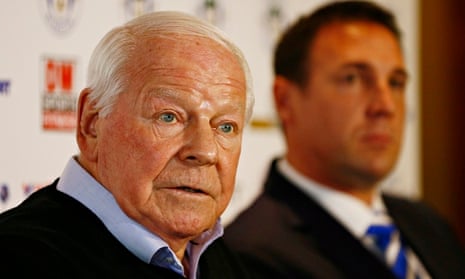At half-time at my standup gigs these days, I ask the audience to tweet me, and sometimes I read out these tweets in the second half, in the hope they might lead somewhere funny. On Monday, at Newcastle’s Theatre Royal, someone tweeted me – and I’m not going to name them, as I have no interest in bringing the Twitter pitchfork mobs down on anyone’s head – “Can you do something about the bar prices here being so antisemitic?”
I read this one out, even though I knew it wasn’t funny. I was interested in how someone who watched the first half of my show, which has got a fair bit in it about antisemitism, could still send me a clearly antisemitic tweet – could even include the word – and, crucially, not realise it. That tweet says: the drink prices here are too high; that will particularly upset Jews – won’t it? – because Jews love money. And the idea that Jews love money – that Jews are greedy, that Jews are misers – isn’t just a persistent myth: it’s one of the very few racist stereotypes that people will still offer up without realising that it is a racist stereotype. They just think it’s true. Isn’t it?
Which brings us to Malky Mackay, Dave Whelan and now Mario Balotelli. Mackay said: nothing like a Jew that sees money slipping through his fingers. Dave Whelan said: Jewish people chase money more than anyone else. And Balotelli reposted a tweet in which Super Mario is compared to a Jew because he’s good at grabbing coins.
These observations do not require much deconstruction. More interesting is Mackay, Whelan and Balotelli’s reaction to the trouble they got into. If I were to sum up this reaction in one word, it would be: what? As in, what’s the problem? Come on, we all know this is true. Dave Whelan in particular had a kind of injured what’s-the-world-coming-to-when-you-can’t-even-say-this attitude in his various semi-apologetic interviews, doing his best to turn the comment into a compliment – Jews, he said, are “shrewd people” – and even bringing out, hilariously, the “some of my best friends are Jewish” defence.
This is characterised as a problem in football, but I don’t think it’s in any way restricted to the sport. My brother was looking to buy a flat once, and the estate agent said to him: “Oh, I’d like to buy around here but the prices are too high and I’m not Jewish enough.” Perhaps he didn’t realise my brother was Jewish. Or, more probably, he did, and thought therefore he would appreciate the remark more.
In those terms, the campaign myself and my brother created, with Kick Racism Out of Football, to raise awareness of the chanting of the Y-word and associated antisemitic abuse at Chelsea, Arsenal, West Ham and other clubs, also wasn’t just about football. It was about a realisation we had that, in a culture much possessed by the idea that certain hate-inspiring words and ideas pertaining to race had now become unacceptable, somehow the hate words and ideas pertaining to Jews had got left out of the unacceptable bracket; or at least put into the “Well, that isn’t quite so bad” bracket; or a “Well, maybe they mean it in a nice way” bracket.
If you think this isn’t the case, it’s worth checking out #antisemitictweets. The depth, variety and just sheer number of hate tweets about Jews is simply breathtaking. And most of them mention money; and, if challenged, almost all of the tweeters convey the same sense of: what? What’s the problem? This attitude is not confined to hate tweeters, silly old football chairmen and the right wing. One of the driving forces of the Y-word campaign was an attempt to query why the word was not in the same arena of unacceptability as the N-word and the P-word. A friend of mine, very much on the left of frame politically, said to me: “But it’s not as bad as the N-word.” I said: “Why?” He said: “Because Jews are rich.” It’s perhaps not worth starting to unpack how much is wrong with that idea (not least the implication that black people cannot possibly be rich). But it points to a key problem as regards the wider apprehension of antisemitism, which is that the left – which, in the end, is where anti-racist ideas start and trickle down even to people like Dave Whelan and Mario Balotelli – has always been a little bit ambiguous about Jews (an ambiguity that has clearly become even more ambiguous since Israel was deemed the nutcase pariah state du jour).
Jews are, after all, the only entity, in terms of the racist stereotype that operates on two levels, low and high status – that can be imagined as vermin but also as moneyed and secretly in control. The moneyed and in-control thing undoubtedly still has some traction on the left (see France), and it’s why Jews, at best, might not be considered to be really in need of the protections that anti-racism offers, and at worst might be the enemy.
You can see this, I think, in the way Mackay, Whelan and Balotelli’s remarks are referred to in reportage as involving racism and antisemitism. What is that? Why are those two things separated? Antisemitism is racism. When I’ve said this before on Twitter, people get into a pedantic spin about whether or not Jews are a race or a religion, but that’s irrelevant: they are considered a race by racists. The Gestapo were very happy to murder Jewish atheists. Therefore antisemitism is racism, and the separation of it from racism in general can be considered a way of saying “obviously, though, not as bad as racism towards black or Asian people: that’s clearly the top racism”.
Another example: a tweeter who once called me a Jewish prick was called a racist, and replied: I can’t be racist, I’m a Pakistani.” For him – and for quite a lot of others – racism is black and white (or brown and white) alone. But as we know from history, that’s very wrong.
Jewish people do need those protections. Which is why Mario Balotelli, Malky Mackay and Dave Whelan – and indeed the person who sent me that tweet in Newcastle – need to be called out for their what’s-wrong-with-that? belief that Jews are miserly, and should just be told: it’s racist. Not: it’s antisemitic – even though it is. Two concepts – two “bad” things they are simply not meant to do any more – may be too much for simple minds. Just: it’s racist. Oh, and by the way, if that person who tweeted me during the gig had actually known anything about Jews, they would have been aware that we wouldn’t have been worried about the price of the drinks: only about the price of the food.








